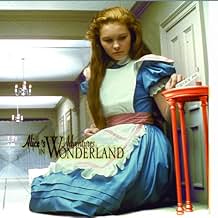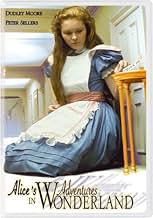A book which details the strange adventures of a young girl in a surreal dreamworld is perhaps not a natural subject for a film, but Lewis Carroll's classic has been filmed many times. Few if any, however, of those filmed versions have themselves achieved classic status. The one exception is possibly Disney's cartoon version; this live-action British version from the early 1970s is less well known but is, I think, superior.
Unlike the Disney version, this film stays faithful to Lewis Carroll's original text, except in one respect. Carroll probably envisaged Alice as a little girl (although her exact age is not given in the book, and Tenniel's famous illustrations show a strange child-woman with a twenty-year-old head on ten-year-old shoulders). In this film, however, Alice is not a child but a beautiful teenager on the verge of womanhood. Although purists may not approve of this change, in my view it actually strengthens the film, in two ways. The first is that Fiona Fullerton makes an enchanting Alice and brings a wonderful sense of freshness and innocence to the role. Paradoxically, she seems more child-like than would many child-actors, whose stock-in-trade is often a brash knowingness and the ability to seem old beyond their years.
The second reason why the film works better with an older Alice is that it attempts to explore the psychological sub-texts of the original novel in a way that the Disney version, for example, did not. The story has a deeper significance than that of merely an entertaining children's story. Alice's bizarre adventures are symbolic of the process of discovery of oneself and of the wider world which constitutes growing up. No doubt amateur Freudians could have great fun interpreting the various incidents, but it is not my purpose here to comment on these interpretations. It is enough to say that Alice must, as must we all, try to make sense of a world which often seems strange and bewildering. Her world is simply a bit stranger than everyone else's is. Given that adolescence is for many of us a difficult, disorientating period, an Alice who is on the border between childhood and adulthood seems entirely appropriate. The title of the film's best-known song, `The Me I Never Knew', strengthens the idea that the book is about the attainment of self-knowledge.
Miss Fullerton is ably assisted by a splendid supporting cast, including some of the best-known British comedians of the period (Peter Sellers, Dudley Moore, Michael Crawford, Spike Milligan, Roy Kinnear) and some actors better known for more serious roles (Ralph Richardson, Michael Hordern). Perhaps the cost of employing so many well-known names emptied the budget, as the sets look rather cheap and crudely made. That, however, is not a serious criticism; indeed, one could even say that the unreal-looking sets contribute to the strange, dreamlike feel of this film. In a surrealist film, realism is not a virtue. 8/10.




































